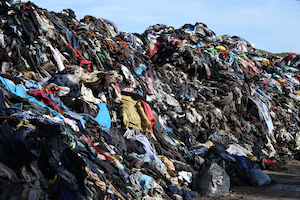John, A giant mountain of clothing is growing in Chile’s Atacama Desert and some of the best-known fashion brands, like Nike and TJ Maxx, are responsible. But there’s hope, with the newly elected leftist president, who is set to take office in March. Gabriel Boric is currently setting his presidential priorities for the coming months – so the time is now to amp up the pressure to make sure that regulating the fashion industry is high on his list. John, if we gather enough support, Gabriel Boric and his cabinet won't be able to ignore us. Gabriel Boric: Regulating the fashion industry should be one of your top priorities This cemetery of clothes is part of a dirty chain of issues: second-hand and unsold clothing that is made in Asia, passes through to Europe and the United States before being dumped in Chile– all a result of the massive rapid-overproduction that the fashion industry pushes. Water pollution, leaking chemicals, and microplastics are just some of the environmental hazards that make the fast fashion industry one of the worst polluters in the world, and a clear example of the devastating impact of corporate neoliberalism that has marked Chile’s history. For decades, Chilean pro-market policies and tax-free havens have enabled these toxic dumping grounds to grow. The Chilean government has always had the power to put people and the planet before profit, but chose the latter. John, but with our community’s pressure, change could be on the horizon. The president-elect, who millions see as a new “symbol of hope”, vowed to create a future for Chile that was more equal and ecological during his presidential campaign. And famously proclaimed “Neoliberalism was born in Chile and here it will die”. Let’s make sure he keeps his promises! Gabriel Boric: Don't let brands like Nike and TJ Maxx use Chile as dumping grounds We know the power of our community works because we've stopped the damages caused by the fashion industry before – over 100,000 SumOfUs members pressured jeans brand Levi's to reduce its carbon emissions. Together, we can use our collective power to do the same in Chile!  Thanks for all that you do, More information: Chile’s Atacama Desert: Where Fast Fashion Goes to Die
EcoWatch. 15 November 2021. Chile’s desert dumping ground for fast fashion leftovers Al Jazeera. 8 November 2021. |
||
